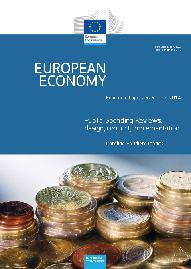Bacchetta, P. & Benhima, K. (2014) “The role of corporate saving in global rebalancing“, VoxEU Organisation, 24 Αυγούστου. Among the various explanations behind global imbalances, the role of corporate saving has received relatively little attention. This column argues that corporate saving is quantitatively relevant, and proposes a theory that is consistent with the stylised facts and useful for understanding the current phase of global rebalancing. The theory implies that, …Read More
Secular stagnation: Facts, causes, and cures
Teulings, C. & Baldwin, R. (2014) “Secular stagnation: Facts, causes, and cures“, VoxEU Organisation Books, 15 Αυγούστου. Six years after the Crisis and the recovery is still anaemic despite years of zero interest rates. Is ‘secular stagnation’ to blame? This column introduces an eBook that gathers the views of leading economists including Summers, Krugman, Gordon, Blanchard, Koo, Eichengreen, Caballero, Glaeser, and a dozen others. It is too early to …Read More
Destabilizing a stable crisis: Employment persistence and government intervention in macroeconomics
Lima, B. C., Grasselli, M. R., Wang, X.-S. & Wu, J. (2013) “Destabilizing a stable crisis: Employment persistence and government intervention in macroeconomics“, Structural Change and Economic Dynamics, No. 30 (2014), pp. 30-51. The basic Keen model is a three-dimensional dynamical system describing the time evolution of the wage share, employment rate, and private debt in a closed economy. In the absence of government intervention this system admits, among …Read More
Evaluating the cost of government credit support: the OECD context
Lucas, D. (2014) “Evaluating the cost of government credit support: the OECD context“. Economic Policy, Vol. 29, Issue 79, pp. 553-597. Governments throughout the OECD allocate a large share of societies’ capital and risk through their credit-related activities. Hence, accurate cost estimates for credit support programmes are a prerequisite for efficient resource allocation, transparency, effective management and public oversight. I find that OECD governments generally take their cost of capital …Read More
The role of creditor seniority in Europe’s sovereign debt crisis
Steinkamp, S. & Westermann, F. (2014) “The role of creditor seniority in Europe’s sovereign debt crisis“. Economic Policy, Vol. 29, Issue 79, pp. 495–552. The share of public debt that is held by lenders with preferred creditor status (i.e. the IMF, ECB, ESM, etc.) has increased substantially during Europe’s sovereign debt crisis. Empirically, we document in both macro and survey data that there exists a close relationship between the increase …Read More
Vocational education and training and the Great Recession: supporting young people in a time of crisis
Heyes, J. (2014) “Vocational education and training and the Great Recession: supporting young people in a time of crisis“, Report 131, European Trade Union Institute (ETUI). During the last five years training and education policies have received strong support at European and international levels. Emphasis has been placed on Initial Vocational Education and Training (IVET) and apprenticeships – which enable workers to gain a foothold in the labour market …Read More
Addressing weak inflation: The European Central Bank’s shopping list
Claeys, G., Darvas, Z., Merler, S. & Guntram, B. (2014) “Addressing weak inflation: The European Central Bank’s shopping list“, Bruegel Institute, Policy Contributions, 06 Μαΐου. There are clear benefits to price stability. High inflation can distort corporate investment decisions and the consumption behaviour of households. Changes to inflation redistribute real wealth and income between different segments of society, such as savers and borrowers, or young and old. Price stability …Read More
Can Investment Save Europe?
Pisani-Ferry, J. (2014) “Can Investment Save Europe?“, Project Syndicate, 30 Ιουλίου. Economic growth in Europe remains disappointing. Virtually all European Union members are expected to post higher output in 2014; but, according to the International Monetary Fund’s latest projections, the average growth rate in the eurozone will barely exceed 1%. And, whereas the British economy is displaying strong momentum, its GDP has only now surpassed the pre-crisis mark. In …Read More
Financial crises: lessons from history for today
Sayek, S. & Taskin, F. (2014) “Financial crises: lessons from history for today“, Economic Policy, Vol. 29, Issue 79, pp. 447–493. Making use of the propensity score matching method, we match earlier crises (pre-2007) with currently ongoing crises (post-2007). The old and new crises are matched in three dimensions: the global setting in which they occurred, the structure of the economy and the domestic vulnerabilities in the pre-crisis period. Our …Read More
Public Spending Reviews: design, conduct, implementation
Vandierendonck, C. (2014) “Public Spending Reviews: design, conduct, implementation“, European Economy, European Commission Economic Papers, 525, Ιούλιος: Βρυξέλλες. This paper proposes to highlight the main features and key success factors of the design, conduct and implementation of spending reviews, based on the experiences of EU Member States. Public expenditure accounts for almost half of the annual wealth created in the EU (49.0% of GDP in 2013). A major policy …Read More








